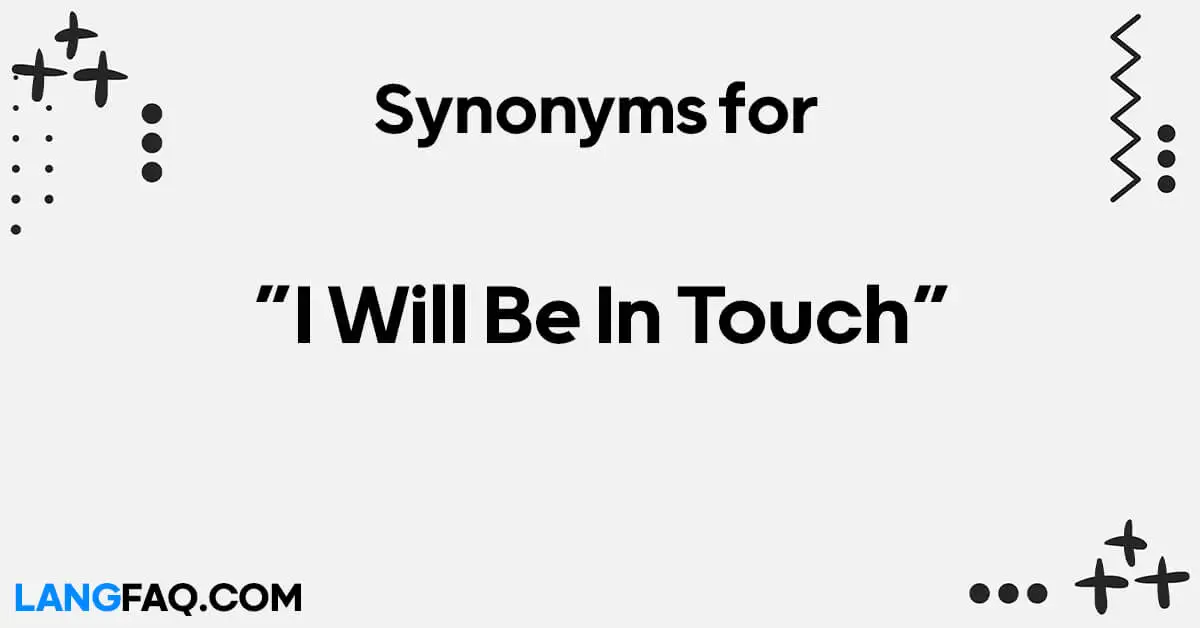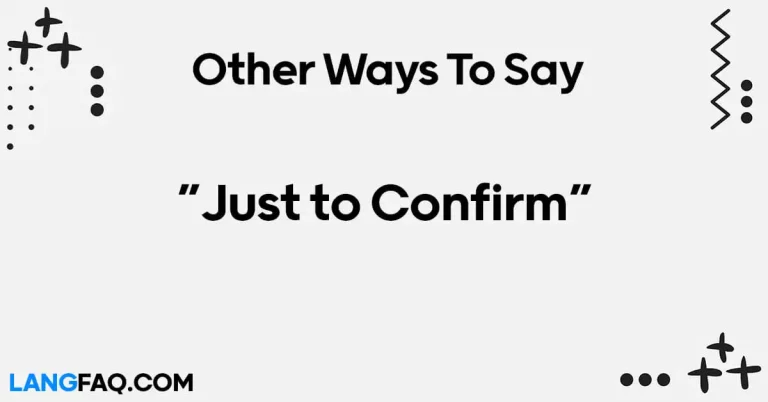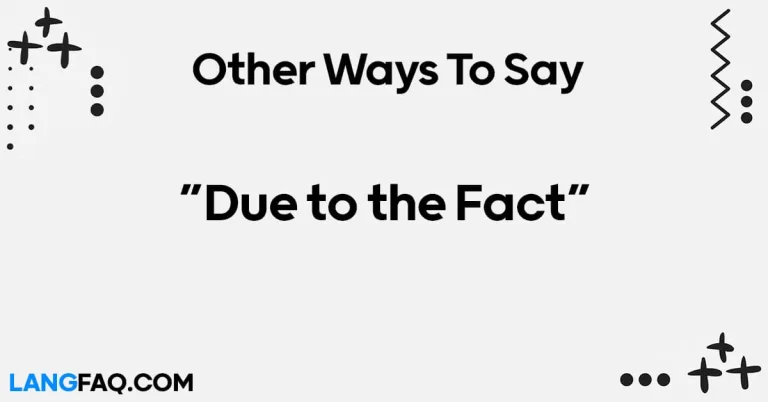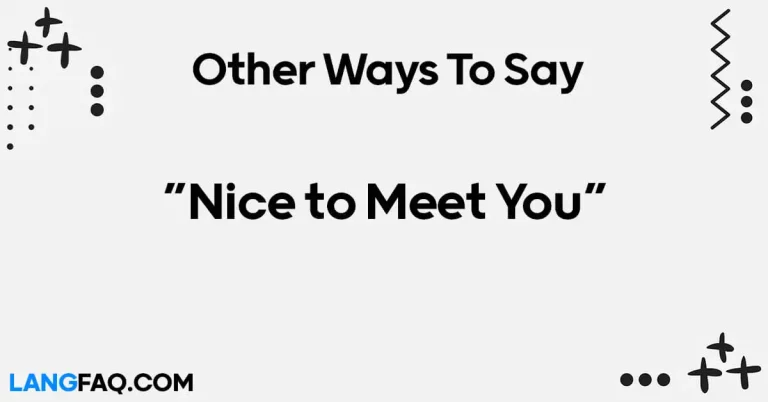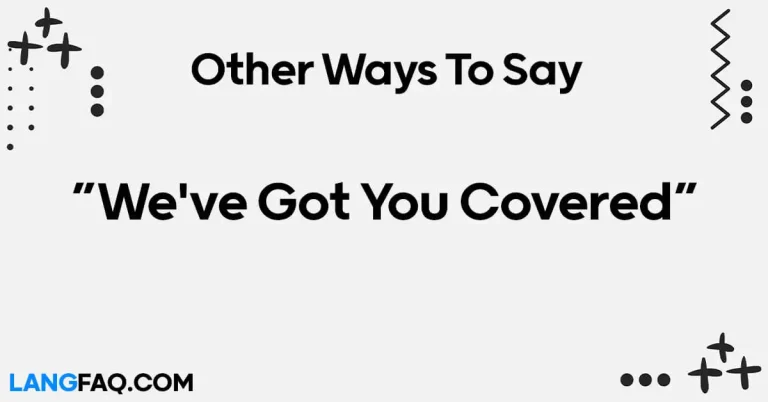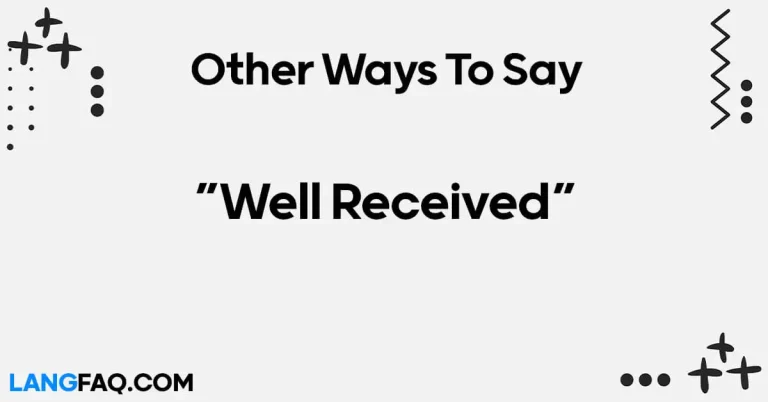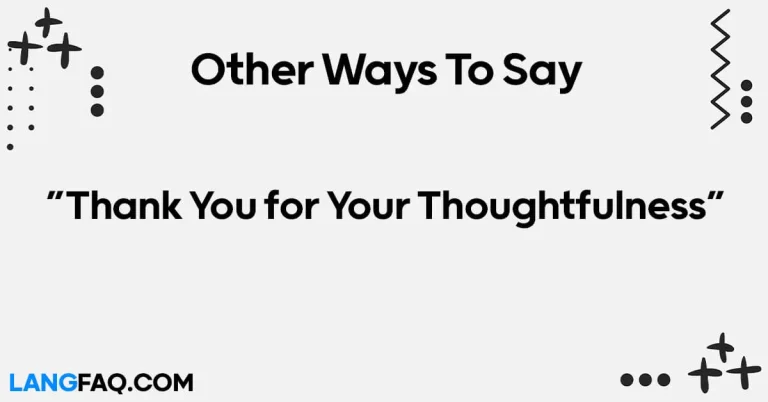In today’s fast-paced world, effective communication is key to building meaningful relationships and achieving success. When you want to express your intention to stay in contact with someone, saying “I will be in touch” may feel repetitive.
That’s why we’ve compiled a list of 14 alternative phrases that can enhance your communication skills and make your conversations more engaging.
In this article, we will explore various ways to convey the same message while keeping your interactions fresh and interesting.
14 Other Ways to Say “I Will Be In Touch”
- I’ll Reach Out Soon: When you want to convey your intention to contact someone shortly, this phrase is a subtle way to do so. It implies that you will initiate the conversation.
- I’ll Drop You a Line: This informal phrase suggests sending a message or making contact in a casual manner. It’s a friendly way to express your intent to stay connected.
- I’ll Be in Contact: A slightly more formal alternative to the standard phrase, this one signifies that you will maintain communication.
- I’ll Get in Touch: This phrase implies that you will take the initiative to establish contact. It portrays you as an active communicator.
- I’ll Give You a Shout: A more casual and friendly way of saying you’ll be in touch, this phrase is often used among friends and peers.
- I’ll Drop You a Note: Similar to “I’ll drop you a line,” this phrase suggests sending a message, note, or email to maintain contact.
- I’ll Keep You Posted: Use this when you want to update someone on a specific situation or keep them informed about ongoing developments.
- I’ll Stay in the Loop: Indicate your intention to remain informed and involved in a particular matter or conversation.
- I’ll Stay Connected: This phrase reflects a commitment to maintaining a continuous line of communication with the person.
- I’ll Stay in Contact: Similar to “I’ll be in contact,” this phrase conveys a sense of responsibility for keeping the connection alive.
- I’ll Touch Base: A term often used in professional settings, it suggests that you will check in with the person or team to ensure alignment.
- I’ll Be in Reach: This phrase implies that you’ll be accessible whenever the person needs to contact you.
- I’ll Be at Your Disposal: A formal way to convey your readiness to assist or communicate as needed.
- I’ll Be in Your Corner: This expression conveys your support and presence when someone requires assistance or guidance.
1. I’ll Reach Out Soon
When to Use:
“I’ll reach out soon” is a polite and proactive way to indicate that you’ll initiate contact. Use it when you want to convey a sense of urgency and show that you’re taking the first step in communication.
Example:
“Hi [Name],
I hope this message finds you well. I wanted to let you know that I’ll reach out soon to discuss our upcoming project. Your insights are crucial, and I’m looking forward to our conversation.
Best regards, [Your Name]”
Tips:
- Follow through promptly to maintain trust.
- Avoid overusing this phrase to keep it effective.
2. I’ll Drop You a Line
When to Use:
“I’ll drop you a line” is a casual and friendly expression suitable for informal conversations. Use it when you want to maintain a lighthearted tone.
Example:
“Hey [Name],
Just wanted to say I’ll drop you a line this weekend to catch up. It’s been too long, and I’m eager to hear how you’ve been.
Talk to you soon, [Your Name]”
Tips:
- Perfect for reconnecting with old friends.
- Keep the content of your message relevant to the context.
3. I’ll Be in Contact
When to Use:
“I’ll be in contact” is a versatile phrase suitable for both professional and personal conversations. It conveys a sense of responsibility and reliability.
Example:
“Dear [Name],
I appreciate your input on the project. I wanted to reassure you that I’ll be in contact as we move forward to keep you updated on our progress.
Warm regards, [Your Name]”
Tips:
- Use it in situations where you need to maintain continuous communication.
- Always follow up on your promise to stay in contact.
4. I’ll Get in Touch
When to Use:
“I’ll get in touch” is straightforward and implies that you’ll initiate contact. It’s suitable for various scenarios, from business to casual conversations.
Example:
“Hello [Name],
I hope you’re doing well. I wanted to let you know that I’ll get in touch later this week to discuss our meeting agenda in detail.
Best regards, [Your Name]”
Tips:
- Specify a timeframe to set expectations.
- Use it in situations where you’re taking the lead in communication.
5. I’ll Give You a Shout
When to Use:
“I’ll give you a shout” is an informal and friendly way to express your intention to contact someone. Use it with friends and peers to keep conversations relaxed.
Example:
“Hey [Name],
Let’s catch up soon! I’ll give you a shout this weekend, and we can plan something fun.
Take care, [Your Name]”
Tips:
- Use it when you want to maintain a laid-back and friendly tone.
- Avoid using it in formal or professional contexts.
6. I’ll Drop You a Note
When to Use:
“I’ll drop you a note” is a variation of “I’ll drop you a line” and is suitable for casual communications. Use it when you plan to send a message or email.
Example:
“Hi [Name],
Just wanted to say thanks for your help. I’ll drop you a note with the details of our next meeting.
Regards, [Your Name]”
Tips:
- Keep the content concise and relevant.
- Use it when sending emails or messages to friends or colleagues.
7. I’ll Keep You Posted
When to Use:
“I’ll keep you posted” is a phrase to use when you want to provide updates or share developments with someone. It’s often used in situations where ongoing communication is essential.
Example:
“Dear [Name],
I wanted to let you know that the project is progressing well. I’ll keep you posted on any significant updates or changes.
Sincerely, [Your Name]”
Tips:
- Use it in professional settings to maintain transparency.
- Ensure that you provide timely updates as promised.
8. I’ll Stay in the Loop
When to Use:
“I’ll stay in the loop” implies your intention to remain informed and involved in a particular matter or conversation. Use it when you want to express your commitment to staying updated.
Example:
“Hello [Name],
Your insights are invaluable, and I appreciate your involvement. I’ll stay in the loop to ensure we make informed decisions moving forward.
Best regards, [Your Name]”
Tips:
- Use it in collaborative settings to emphasize your engagement.
- Keep your commitment to staying informed.
9. I’ll Stay Connected
When to Use:
“I’ll stay connected” reflects your dedication to maintaining a continuous line of communication with someone. Use it to convey your commitment to a long-term relationship.
Example:
“Hi [Name],
It was great meeting you at the conference. I enjoyed our conversation and look forward to staying connected for future collaborations.
Warm regards, [Your Name]”
Tips:
- Use it when building professional relationships.
- Foster connections by following through with communication.
10. I’ll Stay in Contact
When to Use:
“I’ll stay in contact” is similar to “I’ll be in contact” and signifies your responsibility for keeping the connection alive. Use it in various contexts to maintain communication.
Example:
“Dear [Name],
Your expertise is valuable to our team. Rest assured, I’ll stay in contact to ensure we continue to benefit from your insights.
Sincerely, [Your Name]”
Tips:
- Use it to maintain ongoing communication with colleagues or mentors.
- Follow up promptly to show your commitment.
11. I’ll Touch Base
When to Use:
“I’ll touch base” is a professional expression often used in business settings. It implies that you will check in with someone to ensure alignment or provide updates.
Example:
“Hello [Name],
I hope this email finds you well. I wanted to touch base regarding our project’s progress and discuss any potential challenges.
Best regards, [Your Name]”
Tips:
- Use it in business and project management contexts.
- Keep your communication clear and concise when touching base.
12. I’ll Be in Reach
When to Use:
“I’ll be in reach” implies that you’ll be accessible whenever someone needs to contact you. Use it to reassure others of your availability.
Example:
“Hi [Name],
I appreciate your trust in me. Rest assured, I’ll be in reach whenever you need assistance or have questions.
Warm regards, [Your Name]”
Tips:
- Use it when providing support or assistance.
- Be responsive and available as promised.
13. I’ll Be at Your Disposal
When to Use:
“I’ll be at your disposal” is a formal way to convey your readiness to assist or communicate as needed. Use it in professional and service-oriented contexts.
Example:
“Dear [Name],
Your satisfaction is our priority. Please know that I’ll be at your disposal to address any concerns or questions you may have.
Sincerely, [Your Name]”
Tips:
- Use it when offering services or assistance.
- Maintain a professional and helpful tone.
14. I’ll Be in Your Corner
When to Use:
“I’ll be in your corner” conveys your support and presence when someone requires assistance or guidance. Use it to offer encouragement and solidarity.
Example:
“Hey [Name],
I heard about your upcoming presentation. Just wanted to let you know that I’ll be in your corner, cheering you on.
You’ve got this! [Your Name]”
Tips:
- Use it to show support and encouragement.
- Offer assistance if needed to back up your words.
Conclusion
In this educational blog post, we’ve explored 14 alternative phrases for “I will be in touch,” each with its unique tone and context. By diversifying your communication with these phrases, you can engage your audience effectively and build stronger connections.
Remember to choose the appropriate phrase based on the situation, maintain transparency in your communication, and always follow through on your promises. Effective communication is not just about the words you use but also about the actions that accompany them.
Frequently Asked Questions (FAQs)
How can I make my communication more engaging?
To make your communication more engaging, use a variety of phrases and expressions to convey your intent. Avoid using the same phrases repeatedly, as it can make your conversations feel monotonous.
Are these phrases suitable for both professional and casual conversations?
Yes, these phrases can be adapted for both professional and casual conversations. However, it’s essential to gauge the formality of the situation and choose the appropriate phrase accordingly.
Can I mix and match these phrases in a single conversation?
Certainly! Mixing and matching these phrases can add depth and nuance to your communication. Just ensure that your choices align with the context and tone of the conversation.
Is it essential to use alternative phrases, or can I stick to the traditional “I will be in touch”?
While using traditional phrases like “I will be in touch” is perfectly acceptable, incorporating alternative phrases can make your communication more engaging and memorable.
How can I improve my communication skills?
To enhance your communication skills, practice active listening, ask open-ended questions, and pay attention to nonverbal cues. Additionally, expanding your vocabulary with alternative phrases can help diversify your conversations.
Can you provide more examples of phrases for staying in touch?
Certainly! Here are a few more phrases: “I’ll drop you a message,” “I’ll stay on your radar,” and “I’ll be in your inbox.”
Conclusion
Effective communication is an invaluable skill in both personal and professional life. By incorporating these alternative phrases into your conversations, you can enhance your communication skills, keep your interactions fresh, and build stronger connections with others. Remember that the key to successful communication lies in expressing your intent clearly while maintaining a positive and engaging tone.

